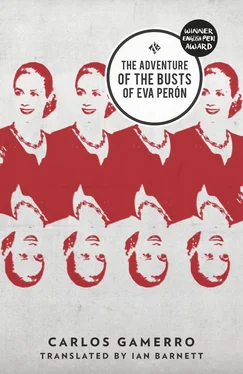Carlos Gamerro - The Adventure of the Busts of Eva Perón
Здесь есть возможность читать онлайн «Carlos Gamerro - The Adventure of the Busts of Eva Perón» весь текст электронной книги совершенно бесплатно (целиком полную версию без сокращений). В некоторых случаях можно слушать аудио, скачать через торрент в формате fb2 и присутствует краткое содержание. Год выпуска: 2015, Издательство: And Other Stories, Жанр: Современная проза, на английском языке. Описание произведения, (предисловие) а так же отзывы посетителей доступны на портале библиотеки ЛибКат.
- Название:The Adventure of the Busts of Eva Perón
- Автор:
- Издательство:And Other Stories
- Жанр:
- Год:2015
- ISBN:нет данных
- Рейтинг книги:3 / 5. Голосов: 1
-
Избранное:Добавить в избранное
- Отзывы:
-
Ваша оценка:
- 60
- 1
- 2
- 3
- 4
- 5
The Adventure of the Busts of Eva Perón: краткое содержание, описание и аннотация
Предлагаем к чтению аннотацию, описание, краткое содержание или предисловие (зависит от того, что написал сам автор книги «The Adventure of the Busts of Eva Perón»). Если вы не нашли необходимую информацию о книге — напишите в комментариях, мы постараемся отыскать её.
Carlos Gamerro's novel is a caustic and original take on Argentina's history.
The Adventure of the Busts of Eva Perón — читать онлайн бесплатно полную книгу (весь текст) целиком
Ниже представлен текст книги, разбитый по страницам. Система сохранения места последней прочитанной страницы, позволяет с удобством читать онлайн бесплатно книгу «The Adventure of the Busts of Eva Perón», без необходимости каждый раз заново искать на чём Вы остановились. Поставьте закладку, и сможете в любой момент перейти на страницу, на которой закончили чтение.
Интервал:
Закладка:
‘The order’s come through from below! You can leave whenever you like!’
A jug of iced water poured into a pan of boiling water could not have been quicker-acting. The pandemonium ceased instantly and initial bemusement crept over the faces of the office staff, to be followed in quick succession, as they looked at those of their neighbours, by guilty relief, shame, embarrassment and, finally, ill-concealed satisfaction. Without saying a word, first one (Suárez), then another (unknown) began to make their way to the office to collect their things and leave. Ramírez tried to stem the flow with some feeble words of persuasion.
‘Comrades… Where are you going? Are we going to miss the chance to show that they’re wrong in what they say: that when the chips are down, we throw in the towel? That we’re all talk? That we wouldn’t say boo to a goose? Don’t you want to stay, so that you can go back to your houses with your heads held high and say that we’ve earned some respect for once? If we leave, comrades… what will we come back to? The same old thing?’
Out of compassion Marroné went over to him.
‘It’s useless, pal. They aren’t listening.’
Ramírez looked at him with blank eyes that showed no sign of understanding or recognition, and then, leaning on Marroné’s shoulder, climbed down from the chair and headed for the office. His colleagues had started queuing up outside the service lift. In their midst, looking like butter wouldn’t melt in his mouth, was Sansimón’s sales manager, the one who had made a botched attempt to flee the day before.
‘Oy! You! Papillon! Trying to pull a fast one, are we? Get back in there with the others,’ Marroné said to him, tapping him twice on the shoulder.
The sales manager meekly obeyed without a word, merely casting a surprised look in Marroné’s direction, as if his face were familiar but he couldn’t say where from… Marroné rubbed his hands with pleasure. It was like a role play, and he was enjoying it enormously. It was a rule that always proved infallible: you never know your potential until you start exploring it. Just then the service lift arrived and Paddy, carrying a newspaper, stepped out, along with two others in black helmets. Paddy’s jaw dropped when he saw him.
‘Ernesto! What are you up to?’ he said to him.
Marroné replied with a shrug and an expression of defiance.
‘What? Are you the only one that can proletarianise yourself around here?’
The worker guards had started bringing the office workers down in two groups of ten. Dorita was in the second one, the service lift this time slicing her up the other way round, starting with her feet and finishing with her faintly moist eyes, which remained fixed on him until the last moment. Out of politeness he kept up his smile and raised hand until they vanished from sight, then turned to Paddy, who was still staring at him in astonishment.
‘Well… that’s the petit bourgeoisie off our backs. One less problem, right?’
‘And you, Ernesto? What are you going to do?’
There was something he needed to know before he took a decision.
‘What about the rest of the country? What’s happening with the other plasterworks?’
Paddy smiled.
‘All occupied. Nothing can stop us, Ernesto!’
‘I’m sticking around then,’ said Marroné without hesitation.
Paddy locked with him in fraternal embrace, and Marroné was awash with happiness. By what strange and crooked ways life made your wishes come true: Paddy and he were friends at last. As they parted, Paddy unfolded the magazine he’d been carrying and held it out to him.
‘Here.’
‘What is it?’ Marroné asked.
‘The reading matter I promised you. Give it a look and we’ll discuss it tomorrow.’
Marroné glanced at the title page. On the cover a woman as taut and vibrant as a tensed string was haranguing a dark expanse that presumably harboured a multitude within, and above her tight bun, in red graffiti letters, streamed the caption ‘EVITA MONTONERA’.
* * *
The cars pulled away one by one: Gómez’s Peugeot, with González in the passenger seat; an impeccably preserved Auto Union with Fernández at the wheel; a Fiat 600 with Suárez, Ramírez, Nidia and Dorita squeezed inside it; and a Fiat 1500, a Citroën 3CV and a Renault 4L with all the others. Through the high window overlooking the car park, Marroné watched them all as they clambered in, turned on their engines and headlights, and made for the entrance gate held open for them by the armed guards. It was getting dark but, far from letting up, the heat was mounting; heavy burgundy clouds, lit up by the recent passage of the sun, still burnt in the west, while others, the colour of lead and ash, gathered in the northern sky like an Indian raiding party.
What Marroné needed now was a quiet place to sit down and read the Eva Perón photonovel without interruption, so, after recovering his briefcase from the devastated main office, through which the rebellion had swept like a gale, one at a time he tried the doorknobs until he found one that turned, and crossed into a deserted office. After waiting for the few seconds the flickering fluorescent tube needed to provide a steady light, he made resolutely for the toilet, where he unbuckled his belt and sat down with the photonovel open on page one.
1919. Despite enjoying true democracy for the first time in its entire history, the country toiled under the double yoke of Saxon imperialism and the land-owning oligarchy , he read, reshuffling his buttocks on the toilet seat. A nation divided into a civilised, white, European metropolis and a barbarian, American, mestizo hinterland. A wealthy country, rich in paupers. A country where patriots pay and traitors prosper . One 7th May, in a small town in this country — a town like so many other Pampas towns, founded on lands snatched from our Indian brothers by the military — was born one of the greatest revolutionaries America has ever seen: Eva Perón , read the words above the photo, which showed an English-style train station, a cluster of silvery silos and the words ‘LOS TOLDOS’ in block letters on a shed wall. In the next photo was a woman in a little woollen jacket and headscarf, holding aloft a doll in the role of a newborn baby and exclaiming in an enthusiastic speech bubble: ‘ Look at her, Juan! Isn’t she beautiful? ’ The man these words full of hope were addressed to was older and smartly attired in a double-breasted pinstripe suit, with glossy hair and a finely pencilled moustache over his disdainful upper lip. His bubble was not one of dialogue, but of thought. It read: ‘ This one makes five. Time to get savvy. ’
True to his class values , Marroné went on reading, Eva’s father, Juan Duarte, left his wife (by devotion if not by law ) and five children for his ‘legitimate’ family in Chivilcoy.
Having experienced social rejection at first hand, Eva knew from a very young age which side she stood on , read the caption to the next photo, which showed her as a little girl in plaits and polka dots, shielding a frightened beggar boy from three brilliantined brats in short trousers and lace-up shoes, with rocks in their hands; and Eva’s thought bubble bloomed with her first tentative childish judgement: ‘ Even as a little girl, every injustice was like a splinter in my soul .’
On encountering this uncomfortable term, Marroné shuffled restlessly on his toilet seat as if fearing that some concealed peeping Tom could see not just his actions (he was in the bathroom after all) but the very contents of his mind, and that was, of course, absurd. He made the most of this pause to try a few strains, but to no avail. The next few boxes illustrated a string of soap-opera clichés: the selfless mother hunched over her Singer, pedalling into the small hours of the morning; the same mother in mourning, sheltering her five chicks under her wing like a black hen, and bowing before a lady in satin and mink who stood behind a closed wrought-iron gate, barking at her a bubble with the words ‘ How dare you? Get those bastards out of my sight, you shameless hussy! ’ while the caption below explained that Eva was just seven when Juan Duarte died in a car accident and she suffered the humiliation of not being able to attend her father’s funeral ; then little Eva taking communion in a borrowed dress; Eva at school practising recitation and dreaming of being an actress; and the fifteen-year-old Eva evading the advances of a brilliantined beau who promised to take her to Buenos Aires and make her a star while his bubble revealed his wicked intentions, and hers, her precocious shrewdness: ‘ If this city slicker thinks he’s going to pull a fast one on me, he’s got another thing coming. ’
Читать дальшеИнтервал:
Закладка:
Похожие книги на «The Adventure of the Busts of Eva Perón»
Представляем Вашему вниманию похожие книги на «The Adventure of the Busts of Eva Perón» списком для выбора. Мы отобрали схожую по названию и смыслу литературу в надежде предоставить читателям больше вариантов отыскать новые, интересные, ещё непрочитанные произведения.
Обсуждение, отзывы о книге «The Adventure of the Busts of Eva Perón» и просто собственные мнения читателей. Оставьте ваши комментарии, напишите, что Вы думаете о произведении, его смысле или главных героях. Укажите что конкретно понравилось, а что нет, и почему Вы так считаете.











